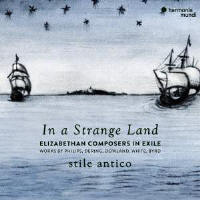Texte paru dans: / Appeared in: |
|
|
Reviewer: J.
F. Weber
Stile antico, a group of 13
mixed voices, has won my admiration ever since its first disc (Fanfare
30:5), despite my partiality to integral collections over more diffuse
groups of works, for its collections are always tightly focused. Here it
adopts an approach that we have heard several times, gathering music from
the period of Catholic recusancy in England. The most interesting example of
this is a motet that Philippe de Monte composed in 1583 on the first four
verses of Psalm 136 (137), Super flumina Babylonis. The Kapellmeister at the
Hapsburg court, he sent it to William Byrd, wondering (as the notes put it,
quoting the text) whether Byrd had to hang up his harp in a strange land.
Byrd answered a year later by setting verses 4–7 of the psalm, Quomodo
cantabimus, as if “his right hand had lost none of its cunning.” He began
this motet by repeating the question that de Monte set, “How shall we sing
the Lord’s song in a strange land?” as if to announce his reply.
The juxtaposition of these two
motets on disc began with Harry Christophers (14:5) as part of a remarkable
program of Byrd’s Mass for Four Voices with its poignant “grant us peace”
and the Propers of Ss. Peter and Paul from the Gradualia (for the recusants’
adherence to the See of Peter and for Byrd’s patron Sir John Petrie, whose
estate was named Ingatestone as a pun on the rock on which Christ would
build his Church). Then Andrew Carwood included the pairing in one disc of
his complete sacred music of Byrd (23:2). I Fagiolini then put together a
program like the present one, The Caged Byrd: Music from a time of
persecution, complementing the pairing entirely with Byrd’s music (21:3).
Then Gabriel Crouch offered a collection of both Byrd and de Monte titled
The Word Unspoken, referring to the underlying meaning of the Scriptural
texts that were full of hidden analogies to the dire situation of the
recusants (36:4). Most recently another such program by Owen Rees was titled
Libera nos: The cry of the oppressed, with a selection almost entirely
different from the present disc (37:3). Had I reviewed it, I would have
provided the issue number with the label name. It is the only one of these
recordings that I have not heard. Now we have a sixth example, and it is a
worthy companion to the others.
This marvelous new disc takes
a broader view of music in a strange land. The notes admit that Dowland, who
leads off the program, was hardly a religious exile when he was living in
Denmark. His two selections set the mood by displaying his familiar
melancholy. Richard Dering, however, lived for a long time in the Low
Countries, only returning to England in 1625 to serve Charles I’s Catholic
queen. Peter Philips, too, lived in exile in the Low Countries and elsewhere
on the Continent after 1582 until his death. Robert White’s Lamentations,
like that of Tallis, conjures up Jeremiah’s sadness at the destruction of
Jerusalem and the exile to Babylonia as a reflection of his own plight under
Elizabeth. The suggestion in the notes that White’s fame was eclipsed by the
printing monopoly enjoyed by Tallis and Byrd is hard to accept, given that
he died a year before the monopoly was even granted.
The two halves of Psalm 136
are placed in proper sequence between the two Philips pieces. While Stile
antico once gave us a piece by John McCabe (36:4), contemporary pieces are
uncommon on their discs. The piece by Huw Watkins (b. 1976) was commissioned
for the group, a setting of a Shakespeare poem that is seen as an allegory
of Catholic martyrs. (Shakespeare was thought to have Catholic sympathies,
at the least.) In that case, the phoenix and the turtle dove could represent
St. Anne Line and her husband Roger. It is under six minutes and the sound
is as far from the 16th century as one would expect, but it is an
interesting setting. As always, Stile Antico covers itself in glory. | |
|
|
|
|
|
|
|
Cliquez l'un ou l'autre
bouton pour découvrir bien d'autres critiques de CD |
|




